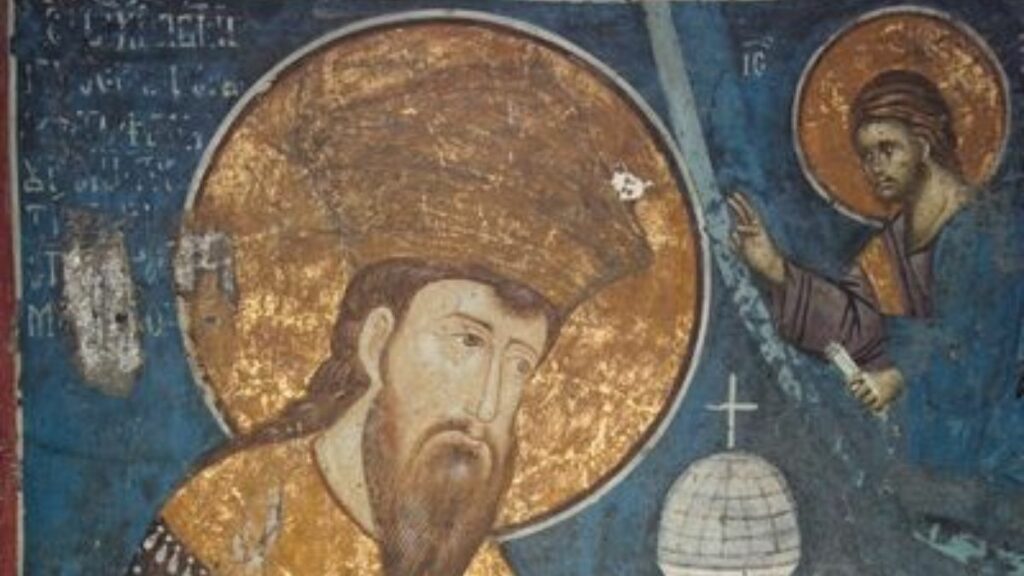Last updated on November 28th, 2022 at 04:37 pm
Visoki Dečani near Bistrica–endowment of Saint King Stefan and Emperor Dušan
This endowment of the Holy King Stefan of Dečani was built between 1327 and 1335, in the fertile valley of the Bistrica River, at the foot of Mt Prokletije, in Kosovo and Metohija. The construction of this Monastery as the endowment was begun by King Stefan of Dečani, the son of the Serbian King Milutin, and completed by his son, the Serbian Emperor Stefan Dušan. In addition to the great architecture, incredible history, as well as the hospitality of the brethren of this Monastery, Visoki Dečani is most famous for the miraculous relics of the Holy King Stefan of Dečani, which are still kept in this sanctuary.
Around the incorruptible remains of the Holy King, miraculous healings have been taking place for centuries. There are countless examples of miracles that took place by the kivot with the remains of the Holy King: the blind receiving their sight, those unable to walk–walking again, and childless couples praying for childbirth. Monks in this sanctuary have been recording the miracles they witnessed for centuries. From the rich monastery archive, we selected some of the miracles from the beginning of the 20th century.
Healing of the sick Arnaut girl
July 1938 I was with my wife, now deceased, on a trip through Southern Serbia. On the way, we visited the Dečani monastery for the first time and stayed there for three days. During that time, we witnessed the miraculous healing of a sick 15 or 16-year-old Arnaut (Muslim–ed.) girl. She was completely unable to move, and they brought her on a cart to the monastery gate, and from there carried her in on their hands and laid her in front of the kivot of the Holy King. One of the monks read prayers over her and anointed the main parts of her body with the oil from the votive candle above the kivot. After that, with his help, the little girl slowly stood up, kissed the remains of the saint and then slowly left the church on her own, and came to the car in the outer courtyard of the monastery.
The holy king will not leave the monastery
In the First World War (1914–1918), while the Serbian army was fighting a heavy battle against the Austro-Hungarian army and was retreating in the face of the far superior enemies to the south, the Bulgarians, who collaborated with Austria-Hungary and Germany and attacked the Serbian army from behind, penetrating towards Prizren and Peć, driving the Serbian army into the pathless Albanian ravines. When they reached Dečani in their pursuit, their first concern was to loot the monastery and transfer the relics of the holy king to Sofia, thus taking revenge on him for his victory over their emperor Michael Shishman on Velbazhd on 28 July 1330.
They planned to hurry and reach Dečani before the Austro-Hungarian and German armies, and loot the holy place, because according to the agreement between the Bulgarian and Austro-Hungarian governments on the division of Serbia’s territory, the western part of South Serbia (the area from Kosovska Mitrovica to Peć and Đakovica) had to belong to Austria-Hungary. After arriving in Dečani, the Bulgarians looted the monastery, then loaded four monks (of Russian nationality) into one car, the remains of the holy king into another, and a military guard into the third, and left the monastery.
When they arrived in the village of Dečani (2 km away on the Peć-Đakovica road), the first car with the monks continued to Đakovica, and the second, with the remains of the holy king, stopped at the crossroads and remained motionless. All efforts of the driver and his assistant to get the car started were in vain. Many people gathered to watch what was happening. The Serbs cried out, and the Arnauts were surprised. While the Bulgarians struggled for hours in vain, an Austro-Hungarian cavalry scout appeared from Peć and galloped up to the Bulgarian cars. When the commander of the reconnaissance found out what was going on, he warned the Bulgarians about their loyalty to their allies and ordered them to stay away from the holy king. Then he ordered that the kivot with the remains be taken out of the car and given to the Serbs to return it to the monastery.
The Serbs joyfully returned the holy king to the monastery, and the Bulgarians got into the car, whose engine now started easily, and drove away embarrassed. Seeing what happened, an old Arnaut said to the gathered Arnauts: “You see, the Holy King will not leave Dečani. The Serbs are coming again. Watch what you’re doing!”
